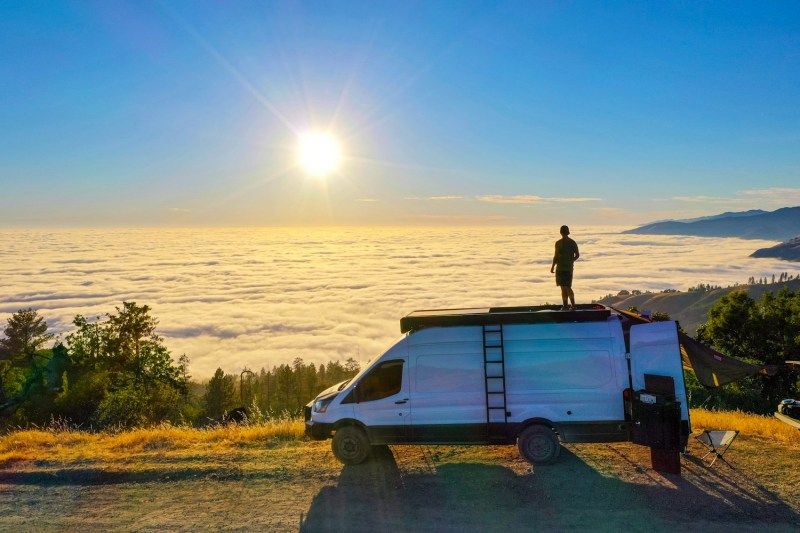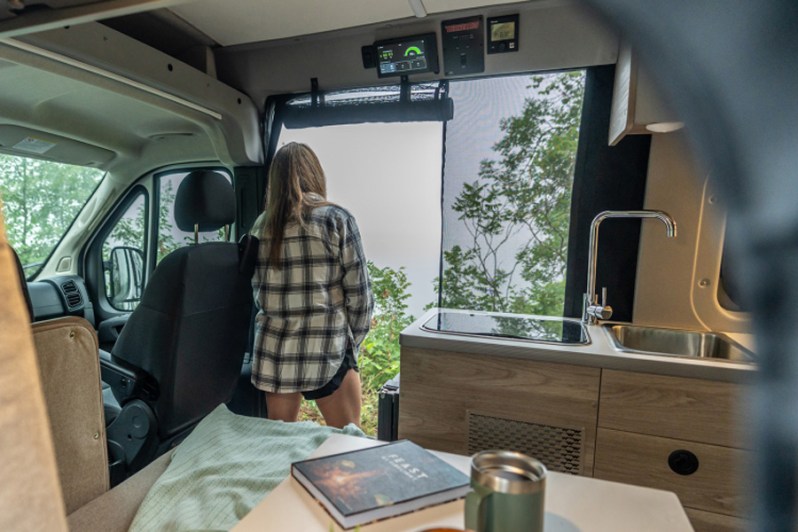
RVing, overlanding, and car camping all exploded in popularity in the last few years (partly thanks to the pandemic). Vanlifing was already on the rise well before most of us ever heard of COVID, but it, too, boomed with tens, maybe hundreds, of thousands of us looking to untether from the material world and hit the open road. It’s no surprise. Instagram and YouTube are awash in videos of young, fit, happy-go-lucky 20-somethings traveling cross-country in tricked-out custom vans. They’re living wild and free without a care, right? But the reality isn’t always so pretty. These are five harsh realities of living in a camper van that no one talks about.

Downsizing into a tiny camper van conversion with limited space isn’t easy
Remember the tiny house movement? So many of us were swept up in the idea of trading the keys to our 2,000-square-foot suburban homes for a walk-in closet on wheels. TLC and HGTV made bank off of several series dedicated to it. We watched many of those wide-eyed, tiny-home-owning hopefuls learn in real-time just how difficult extreme downsizing can be.
I’ve lived for months out of my 4Runner, my own lightweight travel trailer, and a backpack, and I can attest that it’s not easy. Basic tasks like getting dressed, bathing, cooking, and going to the bathroom involve far more planning than they do in a full-size home. This is doubly true in a tiny camper van where you might not even be able to stand up all the way. The novelty of it can seem like a fun challenge at first. But, when nearly every mundane task becomes a lesson in logistics, forcing you to plan and rethink how to do the most ordinary things throughout your day, it can become tedious and frustrating.

You’re forced to do more with less
The best camper vans have wet baths (with a shower and a toilet), full kitchen appliances, and solar-powered electrical systems. Some models are decidedly stripped down and offer only the basics for everyday living. Either way, if you choose to full-time in a camper van, you’ll need to deal with few utilities or, best-case scenario, limited water and power. Your rig can only hold so much water and store so much power. At least once a week or even every few days, you’ll need to find somewhere to fill your water reservoir, dump your holding tanks, and top up your battery system to keep going. None of this is especially difficult, but it is a logistical concern that you’ll be forced to deal with constantly on the road.

Full-time van life isn’t cheap
One of the loftiest notions people have about vanlifing (or RV’ing) full-time is that they can save a boatload of money over the “traditional” costs of owning a home or living in an apartment. While it can be cheaper, that’s not always the case.
Living in any vehicle for an extended period of time means you might need to pay for parking some or all of the time. Dining out three times a day gets very expensive, so you’ll need to figure out how to source and prepare meals on the go. In more remote areas of the country or those with higher costs of living than you’re used to, this can also be surprisingly costly. Gas is another huge expense. If you’re planning to vanlife full-time, there’s a good chance you’re hoping to travel a lot, and all that moving around costs money. Because most vans are typically gas-guzzlers, fuel costs can easily run north of $1,000 per month, depending on how much you drive.
But one of the biggest expenses of all is vehicle maintenance and repair. Livable vehicles—including everything from the most basic, homegrown van conversions to ultra-luxe class A motorhomes—are complicated machines. There’s a lot that can and will go wrong, and you’ll either need to figure out how to fix it on your own or find someone who can. Even the hardiest DIYers will encounter mechanical issues that they can’t resolve—the kinds that require thousands of dollars in repairs.

“You can’t park here!” (a.k.a. “The Dreaded Knock”)
One of the most glaring issues with living full-time in a camper van is the lack of reliable and legal parking opportunities. In much of the Eastern United States, finding free camping and places to spend the night in your campervan isn’t easy. In the Western U.S., dispersed camping on public lands is plentiful, and, in most cases, it’s legal to park for up to two weeks before you’re required to move elsewhere. These campsites are free, quiet, and often beautiful, but they tend to be located far from essential services like gas stations, grocery stores, or population centers (which can, of course, be a good thing). Regularly driving back and forth between these places and your campsite means more gas and higher fuel costs to plan for.
Finding places to legally park in urban or suburban areas for free or at least cheap is exceedingly difficult almost everywhere in the country. At some point, you’ll probably experience “The Dreaded Knock”—when a police officer, landowner, crazy-eyed HOA president, or all three come knocking on your rig late at night, demanding you move immediately. The stress and mental overhead of constantly having to worry about this is something you should be prepared for.

Van life can be surprisingly isolating and lonely
The last truth is the saddest. It’s not specific to van life but to traveling full-time in general. The fact is, it can get lonely. Full-time van living often means being away from friends and family for weeks or months at a time. It can mean missing out on typical get-togethers, like holidays with your family, your friend’s birthday, or your cousin’s wedding. It makes it hard to maintain a social circle because you’re probably never in one place long enough to build or nurture friendships and other “normal” relationships.
None of this is to discourage you from downsizing your life into a custom camper van if that’s your dream. I can personally attest that living on the road for months with only your most basic essentials is liberating and good for the soul. I only point out the above truths because there’s no getting around them if you’re planning to live the van life (or “go tiny” in some other way). Don’t fear them. Just be prepared.


